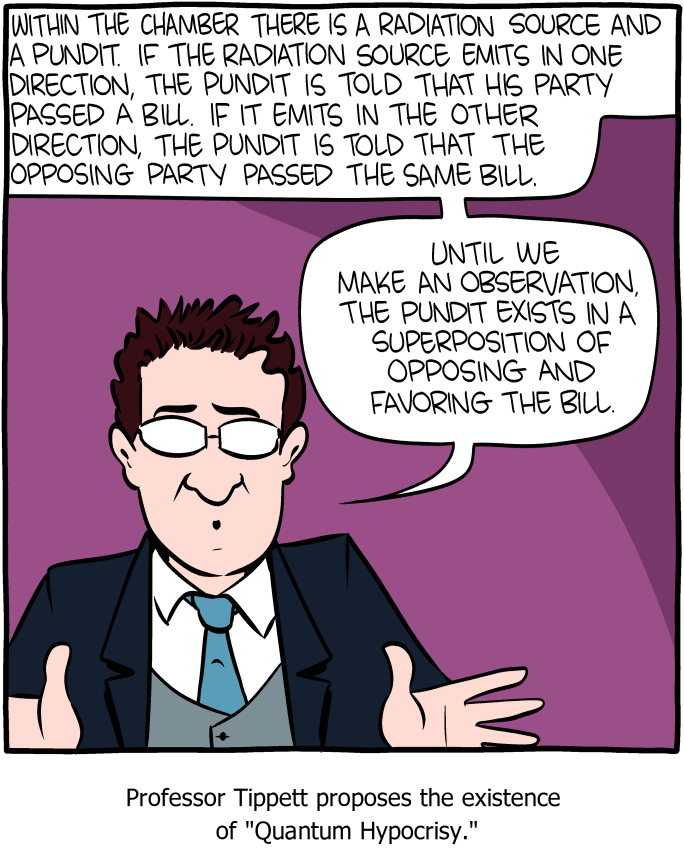Schrödinger's pundit
« previous post | next post »
Today's SMBC:
Mouseover title: "On second thought, let's just leave them in the box."
The aftercomic:

May 21, 2017 @ 7:55 pm · Filed by Mark Liberman under Language and politics, Linguistics in the comics
« previous post | next post »
Today's SMBC:
Mouseover title: "On second thought, let's just leave them in the box."
The aftercomic:

May 21, 2017 @ 7:55 pm · Filed by Mark Liberman under Language and politics, Linguistics in the comics
Powered By WordPress

Tom S. Fox said,
May 21, 2017 @ 8:19 pm
Here is a similar experiment:
Instead of a pundit, put a Democrat in the chamber. If the radiation source emits in one direction, tell him that Trump fired Comey. If it emits in the other direction, say he didn’t fire Comey. The Democrat is now in a superposition of being in favor of and against firing Comey.
Ambarish Sridharanarayanan said,
May 21, 2017 @ 8:19 pm
Has "pundit" come to mean a political expert? I'm familiar with the word in Tamil, and (probably because of that) I assumed in English too that it meant any sort of expert.
Jonathan Smith said,
May 21, 2017 @ 8:46 pm
@Tom S. Fox
Congratulations, you have understood half the joke. Keep thinking!
Saurs said,
May 21, 2017 @ 9:01 pm
Democrats wanted Comey fired because the Russia investigation was too close for comfort? That's Fake News to me!
D.O. said,
May 21, 2017 @ 9:25 pm
What is the purpose of keeping a pundit in the box? In my observation, they are perfectly capable of demonstrating this sort of behavior out in the open.
Narmitaj said,
May 22, 2017 @ 12:17 am
I would have thought a pundit, as a "political expert" writing in the press or talking on TV, was at least notionally impartial and didn't have a party as such. In the cartoon it sounds more like either a spin doctor or even an actual politician who might have to superposition two different things before breakfast.
Sometimes the radiation source can emit two particles, or it swerves. One recent case of a politician's U-turn on the hoof involved the UK's International Development Minister, Rory Stewart. He was being interviewed on the Beeb defending increases in National Insurance contributions for the self-employed in the Tory government's Budget, which was against the policy advanced in the Tory party manifesto in the Election less than two years earlier. The radiation source emitted a new particle while he was on screen – a policy change was announced and he had to defend the new policy.
Rory Stewart is an unusual politician, a bit of a throwback to the 1920s and 30s but in a good way: a diplomat, a Harvard academic, a tutor to princes William and Harry, a (short-term) Black Watch soldier, an author, a documentary-maker, an MP and an explorer – in his 20s for two years he walked 6000 miles across Pakistan, Iran, Afghanistan, India and Nepal. After the invasion of Iraq he was deputy Governor of two provinces, at the age of 30; this last event resulted last month in a new West End play about his experiences.
Sean M said,
May 22, 2017 @ 2:06 am
Ambarish: in American English, it is more or less "a prominent figure who speaks loudly about politics and considers themself an expert." Whether most of the people who fill that role know more about politics than a clever teenager (and so are true experts) is a bit controversial; they certainly are not experts in predicting the future.
jaap said,
May 22, 2017 @ 3:26 am
I think that in the UK, pundit is most often used for people pontificating about sport, but certainly not exclusively so. It is my impression that when used on non-sports contexts, it is often qualified ("television pundit", "political pundit" etc).
Philip Taylor said,
May 22, 2017 @ 4:46 am
Presumably that is singular "them" in the after-comic.
Sean M said,
May 22, 2017 @ 5:57 am
jaap: That is interesting, and reinforces my feeling that what makes someone a pundit in English is a particular kind of speaking or writing in the mass media. Someone who lectures people in his favourite bar about the latest draft of hockey players, or who writes reports for the internal use of a political party, would not normally be called a pundit, whatever their level of expertise.
Lazar said,
May 22, 2017 @ 7:43 am
I'd also note that the non-standard pronunciation "pundant" is somewhat common in AmEng, analogous to "tenant" for "tenet".
J.W. Brewer said,
May 22, 2017 @ 11:13 am
"Person who blathers self-confidently about politics on television and/or the internet" as the default/core/unmarked meaning of "pundit" in AmEng seems to be a comparatively recent development, based on my quick skim of hits between 1930 and 1980 in the google books corpus where that sort of sense or even one directly ancestral to it seems to be the exception rather than the rule. I haven't done more recent excavation to see exactly when that sense became dominant (which could perhaps be tracked against the timeline of the rise of particular genres of tv programming).
mg said,
May 22, 2017 @ 11:37 am
How do you find the after-comic?
Ernie in Berkeley said,
May 22, 2017 @ 12:07 pm
>How do you find the after-comic?
Press the red button at the bottom of the comic. You have to be at the smbc.com site, though.
Guy said,
May 22, 2017 @ 12:09 pm
@mg
Depending on the platform, hover over or tap the red button under the comic.
mg said,
May 22, 2017 @ 12:16 pm
@Ernie and Guy – thanks!
Jonathan said,
May 22, 2017 @ 12:30 pm
mg: Click on the big red button under the comic and to the right.
Geoff said,
May 22, 2017 @ 6:25 pm
Off thread, perhaps, but I can't resist sharing it: the scenario is a competition with the task 'Write a science-themed short story in less than 100 words.' The winner, IIRC, was something like this:
'In a laboratory at Oxford University a cat is sitting in a box. It's been there for 80 years. It's waiting for someone to open the box to see how it's doing. The cat is not at all sure that it wants this to happen.'